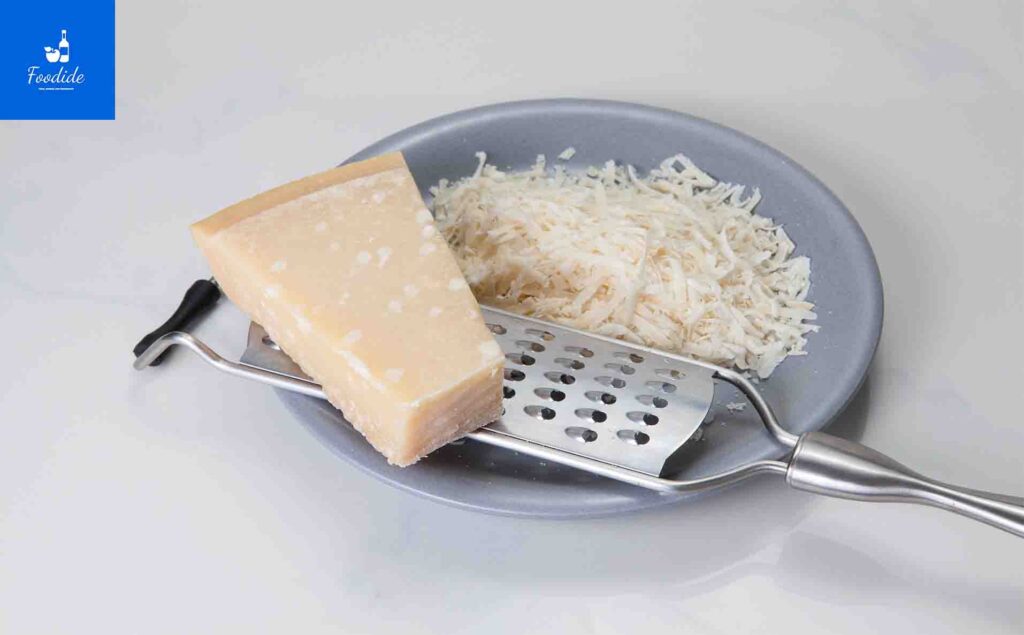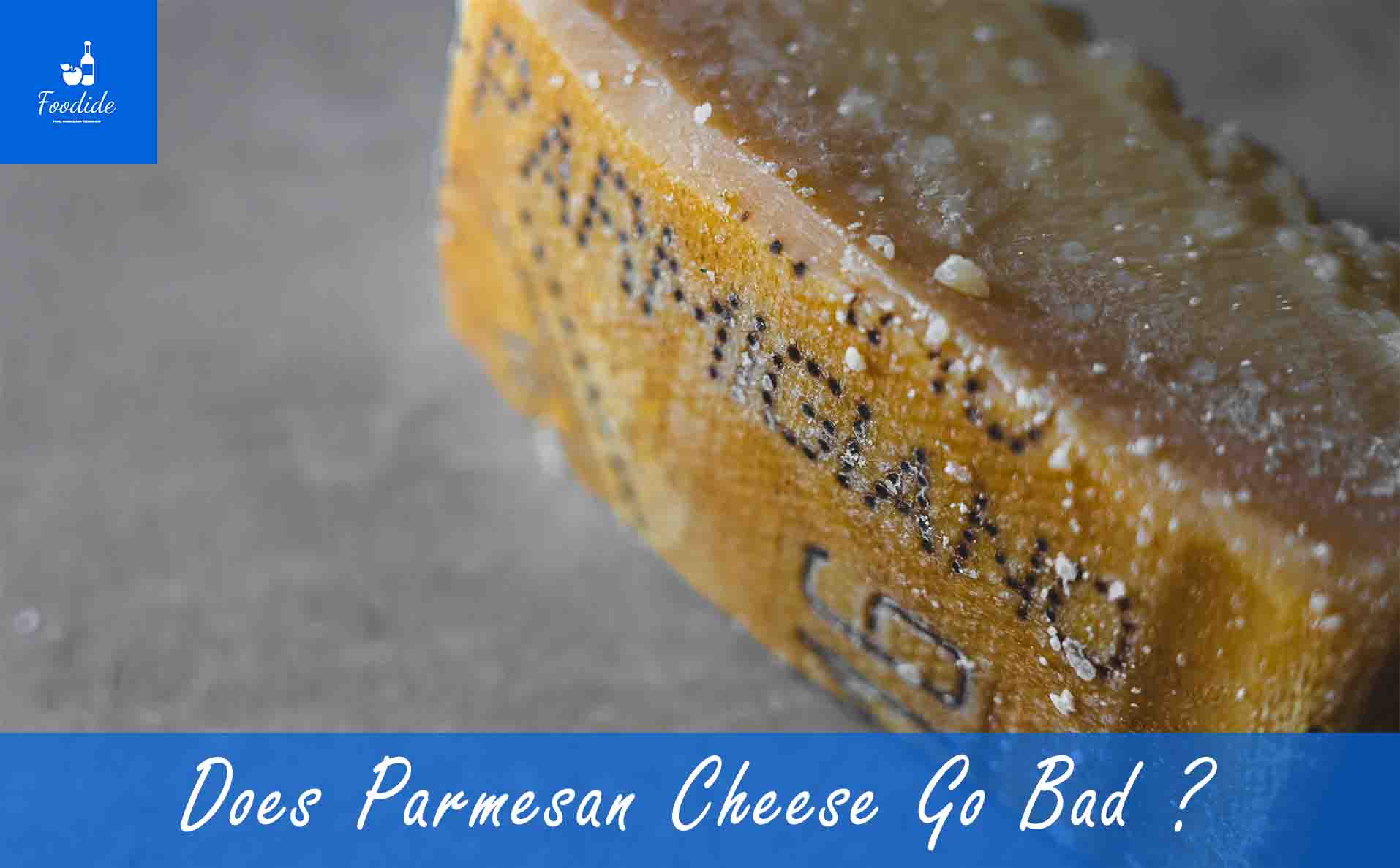Parmesan cheese, also known as Parmigiano-Reggiano, is a hard, granular cheese made from cow’s milk and aged for at least 12 months. Its nutty, sharp, salty flavor profile makes it a popular choice for grating over pasta dishes, salads, and soups.
As a food professional, I greatly appreciate the incredible variety of cheeses in the market. But many people think cheese doesn’t do bad for years or even after expiration.
As a cheese lover, you may also wonder whether Parmesan cheese could go bad. Understanding whether Parmesan cheese can spoil is essential, as consuming bad cheese can lead to unpleasant side effects and even foodborne illnesses.
This blog post will explore whether Parmesan cheese can go bad, how to store it properly, and other valuable tips to ensure you can safely enjoy it. So, let’s dive in and learn more about this beloved cheese!
Factors that Affect Parmesan Cheese’s Shelf Life
Impact of type
It’s important to understand the different types of Parmesan cheese and how they can impact its shelf life. Many types are available, each with its unique flavor and texture.
For example, freshly grated Parmesan cheese will have a different shelf life than a block.

Factors that affect Parmesan Cheese Shelf Life
The shelf life of Parmesan cheese is affected by several factors, including its moisture content and processing method.
Moisture Content
The moisture content of cheese plays a crucial role in determining its life. The lower moisture content result in a longer cheese shelf life. Parmesan cheese has a low moisture content, so it can last for months when stored correctly.
Temperature and humidity
Temperature and humidity are also significant factors that can impact the shelf life of Parmesan cheese. High temperatures and humidity can cause the cheese to spoil faster, while colder temperatures can help extend its shelf life.
Therefore, storing Parmesan cheese in a cool, dry place, such as a refrigerator or a cheese storage container, is essential.
Processing Method
Traditional Parmesan cheese is made using a specific process that involves aging the cheese for at least 12 months. This lengthy aging process results in a harder and drier cheese with a longer shelf life.
In contrast, processed Parmesan cheese may have additives and preservatives that extend its shelf life.
Now that we’ve covered the factors that affect the shelf life of Parmesan cheese let’s move on to discussing how to store this delicious cheese to ensure its longevity properly.
Signs of Spoilage of Parmesan Cheese
Understanding the signs of spoilage in Parmesan cheese is essential to ensure it’s safe for consumption.

Visual signs of spoilage
Visual indicators are often the first signs of spoilage, including mold growth, discoloration, and off odors. Mold growth can range from specks to large colonies, indicating that the cheese is no longer suitable for consumption.
Discoloration can occur due to oxidation, exposure to light, or the growth of bacteria, leading to a yellow or brown hue. Off odors are another clear sign of spoilage and can range from a sour, rotten smell to a strong ammonia odor.
Shelf life of Parmesan Cheese
The shelf life of Parmesan cheese depends on several factors, including the moisture content and processing method. Hard, aged Parmesan cheese typically has a longer shelf life than soft or fresh varieties.
- Proper storage also plays a crucial role in extending the cheese’s lifespan.
- Parmesan cheese can last up to six months when stored in the refrigerator in an airtight container or wrapped in wax paper.
- Freezing the cheese can extend its shelf life up to a year but may alter its texture and flavor.
It’s important to note that Parmesan cheese can still go bad even when properly stored. If you notice any of the visual signs of spoilage or detect odors, it’s best to be cautious and discard the cheese. It’s always better to be safe than sorry regarding food safety.
Best Storage Practices for Parmesan Cheese
Understanding the best storage practices for Parmesan cheese is essential to ensure its freshness and quality. Proper storage methods can significantly impact the cheese’s shelf life and prevent spoilage.

Here are some tips on how to store
Wrap it correctly
Wrapping it in wax or parchment paper is best, as these materials allow the cheese to breathe while preventing moisture buildup. Avoid wrapping it in plastic, as this can cause moisture to accumulate and promote bacterial growth.
Store in a container
You can also store it in an airtight container, such as a plastic container or a resealable bag. This method can help keep the cheese fresh for a longer time, especially if you’re storing it for an extended period.
Refrigerate it
Some cheeses which are hard in texture can be stored at room temperature, but Parmesan cheese should be refrigerated to extend its shelf life. Keeping the cheese in the coldest part of your fridge is best, such as the cheese drawer or the back.
Keep it dry
Make sure to keep the cheese dry to prevent mold growth. You can place a paper towel in the container or bag to absorb moisture.
Avoid exposure
Exposure to light and air can cause the cheese to spoil quickly. Therefore, storing the cheese in a dark and cool place is best.
Remember that storing it at room temperature can cause the cheese to dry and lose flavor. Storing Parmesan cheese is essential to maintain its freshness and quality. Follow the above tips to store your cheese correctly and enjoy its delicious flavor for as long as possible.
Can You Still Eat Parmesan Cheese If Gone Bad?
Regarding food safety, it’s always better to err on the side of caution. Eating spoiled Parmesan cheese can pose some risks to your health.

Consuming spoiled Parmesan cheese can lead to food poisoning symptoms such as nausea, vomiting, and diarrhea.
Whether Parmesan cheese is still safe to eat or not, there are a few things you can look for.
- First, check for any visible signs of mold, discoloration, or an off odor. If you notice any of these signs, it’s best to discard the cheese immediately.
- Additionally, if you’ve stored the cheese improperly, it may have spoiled even if it doesn’t show any visible signs.
So eating spoiled Parmesan cheese or consuming it when gone bad is not recommended.
Creative ways to use leftover Parmesan cheese
If you find yourself with leftover Parmesan cheese, there are still creative ways to use it and save food wastage rather than throwing it away.
For example, you could grate it and add it to soups or pasta dishes, use it as a topping for salads or roasted vegetables, or even make a Parmesan cheese spread for crackers or bread, or can be used as cream cheese frosting.
So, it’s best to practice proper storage techniques to prolong your Parmesan cheese’s shelf life and check for any signs of spoilage before consuming it. If in doubt, discarding the cheese and avoiding potential food safety risks is always safer.
Summary
Parmesan cheese is a delicious and versatile ingredient that can add flavor and texture to many dishes. However, it’s important to understand how to store and handle it properly to avoid foodborne illness and maintain quality.
By following the best storage practices and being aware of the signs of spoilage, you can enjoy your Parmesan cheese safely and deliciously. And, if you find yourself with its leftovers, wait to throw it away.
Plenty of creative ways exist to use it and prevent food waste. So go ahead, savor the flavor of your cheese, and enjoy it with peace of mind.
FAQs
Yes, grated Parmesan cheese can go bad, just like any other type of cheese. Its shelf life depends on factors such as its moisture content, processing method, and storage conditions.
Yes, Parmesan cheese can melt, but it doesn’t melt like softer cheeses like mozzarella or cheddar. Parmesan cheese becomes softer and gooier when heated but doesn’t become completely liquid.
Parmesan cheese should only sit out at room temperature for up to two hours. Bacteria can start growing on cheese when left out for an extended time, which can cause food poisoning.
The shelf life of Parmesan cheese depends on factors such as its moisture content, processing method, and storage conditions. Generally, unopened Parmesan cheese can last up to six to eight months in the refrigerator, while opened cheese should be used within two to four weeks.



![Read more about the article What Does Kefir Taste Like? [Unlock The Truth]](https://foodide.com/wp-content/uploads/2023/04/What-Does-Kefir-Taste-Like-300x200.jpg)
